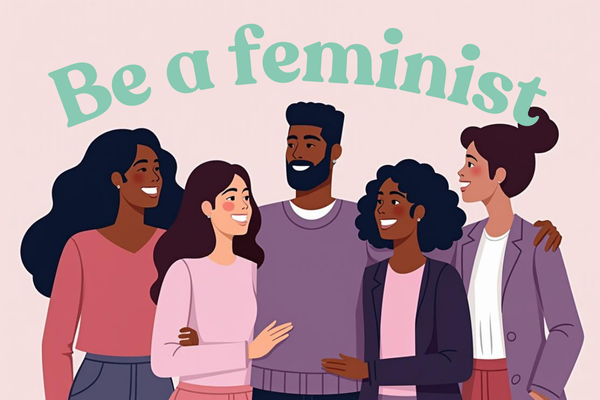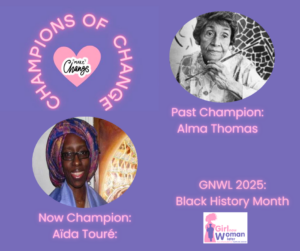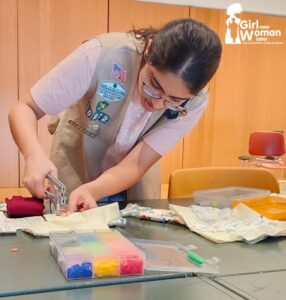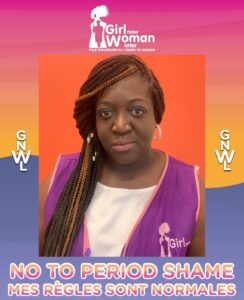Be a Feminist: It is the right thing to do.
I am a feminist, not a terrorist. I am an advocate for the oppressed. Do I still scare you?
If yes, you should read this. Growing up in the ’80s in West Africa, Burkina Faso, wasn’t always fun because I knew then that, as a woman, my opinion didn’t matter as much as my brothers’ opinions did. When it came to my education, my parents and I never discussed what I wanted to accomplish in life. They assumed that I should be glad about the little education I might get, and I should worry and pray that I become a good wife to my husband and bear him children. They always put my brothers first — tending to their cares such as cooking or cleaning after them. I wasn’t jealous. I learned to live with it and accept it. However, by the time I went to college and later moved to the States, everything changed. I realized that I am smart and that I have the potential to be whatever I want with the job I choose. My excitement was cut short because I found out that as a woman, I would not get the same pay rate for the same job as my male counterparts nor the same protection. Why is that? Am I not equally human as him?
The term Feminist was first coined by Mary Wollstonecraft in her 1792 book, “A Vindication of the Rights of Women“. She argues that education is the key for women to gain personal freedom, knowledge, and financial freedom. To her, husband and wife complement each other as equal partners, not only in their social lives but also in their public lives. Thus, husband and wife have a duty to their family and also to the state. More importantly, she argues that the female was not just a beauty to contemplate but a human being capable of thought and reasoning as that, an equal partner to her male counterpart.
Wollstonecraft was born in England in 1759. At the time of her birth and adulthood, a woman’s education was considered superficial in most parts of Europe because it did not make her a capable contributor to her household or the state. She was just an incapable woman with a senseless education. Lots of progress has been made since the publication of her book, but this progress did not go without any revolutionary actions/movements like the women’s suffrage in 1848, which paved the way for the 19th amendment in the U.S. and so on. Contrary to England, Sub-Saharan Africa has experienced the opposite regarding gender equality.
Before the commencement of colonialism, women in Africa were leaders, warriors, economic producers, and political activists in their rights for centuries. The traditional division of labor gives them not only powers to rule and transcend the lineage of chieftaincy through the matrilineal line but also allows them to work in the field, trade, and sell commodities.
First, as a political activist and slave trader, Efunroye Tinubu, a Yoruba aristocrat in Nigeria used her connections and powers to become one of the most successful slave traders, merchants, and political activists in the 1800s. She was later given the title of chieftaincy. Second, through power, African women have demonstrated that they too can lead in war and prevail. In the 19th century in Senegal and Gambia dynasties, two sisters, the Wolof queens Ndaté Yalla and her sister Ndjeumbeut Mbodj became the most powerful women through their battles against French colonialism. These women fought occasionally side by side with their husbands and were not deemed second-class citizens or unqualified for being married. Their husbands, the community, saw and recognized their powers because they were able to prove themselves as capable skilled warriors ready to fight and protect their country at any cost.
Third, through leadership African women ruled over their own countries. Zewditu, the first empress in Ethiopia from 1916-to 1930 became the leader of a lawfully recognized state, Ethiopia. She showed strength and resilience. As a devoted religious, conservative woman, she was a powerful leader with the support of the Ethiopian Orthodox Tewahedo Church. Moreover, 900 years ago, in Burkina Faso, princess Yennenga, the svelte learned to fight at the age of 14 alongside her father, King Nedega. She became highly skilled in spears, javelin, bows, and horse riding, she even had her troop to commend. Asides from her numerous skills, she was viewed as a beautiful woman, which gives the meaning of her name. Her father’s love for her prevented him to give her in marriage.
However, she did rebel against her father, chose her husband, and became the mother of an entire empire, the Mossi Kingdom through her son Ouédraogo. These historic events showed that Feminism did exist and was practiced at one point in Africa before colonialism reinvented the wheel on gender discrimination. With colonialism came the abolition of women’s traditional powers like the chieftaincy or rights to own land. After its independence from colonial imperialism, Africa’s view on gender equality did not change much.
One might argue that it has become a culture passed on to generations and this still cannot be the norm. In her book, “We Should All Be Feminist” Chimamanda Ngozi Adichie argues that “Culture does not make people. People make culture” Adichie 2015, p.46. Every culture is defined by the generation at the time. Every generation adapts or changes their lifestyles to suit their needs, their political affiliations, or socio-economics aspirations. Culture becomes a fluid notion as each generation moves on to the next. Therefore, culture should not be used to describe gender discrimination, and gender should not “prescribes how we should be rather than recognizing how we are” Adichie 2015, p.34.
Today, young girls are still thriving to break the barriers in disciplines such as Sciences, Technology, and Health However, the few that get in those fields are underpaid for the same job compared to their male coworkers. This is tragic and alarming. Africa can no longer afford to ignore these talents let alone their fair wages. For the sake of her development, change needs to happen, and old practices that do not benefit the other sex (female) need to be revamped, Furthermore, half of the other genius pool is also in the female sex which is a fact. There is not a study that has proven that women are less intelligent than men. On the contrary, there are both intelligent.
Sadly, that intelligence is not taken seriously, but instead neglected, and that is a problem. Like the old saying, “Nothing is set in stone.” Some men want to be less masculine, be able to take up jobs that require less physical strength, and not have to worry about how society might see them as weak or docile. Being the breadwinner does not have to be the husband’s job in Africa, that duty can be shared between husband and wife. This is what marriage is about: a partnership agreed between the spouses. In her (Girl Now Woman Later) 2021 campaign, “On the ongoing emancipation of the young girls in Burkina Faso, a subtle necessity,” Girl Now Woman Later, a nonprofit organization interviewed female youth. The objective of the interview was to give them a platform to voice their opinions on gender equality. Most of these girls talk most about how their moms overcome some hurdles and made sacrifices to make sure their schools were paid off whenever their dads didn’t make payments, or how their moms will buy them feminine hygienic products, clothes things that their dads did not care to ask them about, or they just couldn’t ask their dads because they knew that the answer will be “I don’t have the money today, go ask your mom.”
Educating the female to read and write should be a requirement before her marriage because it is the right thing to ensure that her children will also be influenced by their mom’s education. The literacy rate in Sub-Saharan Africa 50 years ago has gotten better among male youth and female youth but it is still lacking. this gap is observed in primary school, with 23 percent of girls excluded compared to 19 percent of boys. Gender disparity still plays a crucial role for female youth dropouts; with Covid 19, gender disparity in school has now become worse. Illiteracy among females is a deficit that holds some countries in the continent from underdeveloped or developing countries to developed countries. Yes, other factors contributed to its development. However, having a minimum requirement of schooling will help in both the short term and long term.
The vile of female oppression is gender inequality. Yes, I am a feminist who strongly believes that women deserve to have a fair share of their labor, women should not be forced to choose between having a career and having a family, they can have them both if they choose to. Women should be respected and given the same rights and opportunities as men. A woman has only two parents just like a man. She does not need her husband or the state to be her parents. she is intellectually capable to suffice on her own. Feminism needs to be thought in school so young boys will learn that girls are not the weak sex like the patriarchal system wants them to believe, rather women are equal to men and deserve to be respected and treaty fairly.
Girl Now Woman Later Inc.
Bienvenue M Konsimbo, MS
Founder& President
WORKS CITED:
Adichie, C. N. (2015). We should all be feminists. Anchor Books
https://www.thoughtco.com/mary-wollstonecraft-vindication-rights-women-3530794
https://www.addisherald.com/empress-zewditu-ethiopias-first-female-head-of-state/





